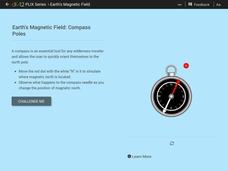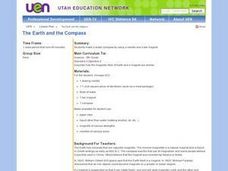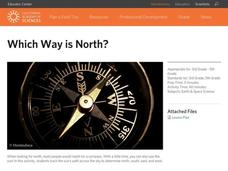American Museum of Natural History
Create a Compass
Historically, humans have used many methods of finding due north. Using a hands-on activity, learners create their own compasses. They then test their compasses in their neighborhood or to assist with stargazing.
CK-12 Foundation
Direction on the Earth: Using a Compass
Navigate the world of orienteering in an informative interactive. Earth science scholars learn practical direction skills, such as proper polar coordinates and pairing compasses with maps. The interactive map allows them to practice...
CK-12 Foundation
Earth's Magnetic Field: Compass Poles
You'll be strangely drawn to this activity! Physical science pupils learn how compasses work in an interesting interactive. The content covers magnetic poles, Earth's magnetic field, and what would happen if Earth's poles swapped places.
Curated OER
Compass Building Instructions
Students build their own compass following a given procedure. In this technology lesson plan, students explain how a compass is used in navigation. They trace the history of its development.
Curated OER
Circle Compass Course
Students practice using a compass for directions. They use a compass to set and walk a designated course. In addition, they discuss careers and recreation that utilize a compass.
Curated OER
Make Your Own Compass
Students explore magnetism. In this "magnets" science lesson, students make a compass with common household items and explain the relationship between what a compass does and the earth's magnetic fields.
Space Awareness
The Sun Compass of the Vikings
Evidence shows the Vikings likely navigated by using a simple sundial to find their course. Videos, a short story, and discussion help bring this time period to life as they study European history with a hands-on experiment. Scholars...
Curated OER
Using a Compass
Students determine how to shoot a bearing. In this compass and orienteering lesson, students review the parts of a compass, practice how to find a bearing and work in groups to practice finding landmark bearings.
Curated OER
Compass Rose
Students describe the movement of the Earth as it relates to the sun. They construct a permanent compass rose and use it to find directions.
Curated OER
The Earth and the Compass
Fifth graders construct a water compass to investigate the effects of Earth's magnetic field and other sources of magnetism. They predict, observe and draw conclusions from their investigation.
California Academy of Science
Which Way is North?
Who needs a compass to find cardinal directions? Just place a stick in the ground and record the movement of its shadow over the course of a day. Then, measure the shadow lengths in order to determine a north-south line. A simple...
Curated OER
Compass Rose Activity
Which direction is which? Use this compass rose labeling worksheet to practice with basic directions as learners fill in the compass themselves. They use cardinal and intermediate direction abbreviations. Consider using their compass on...
Curated OER
Compass Rose
There isn't much learners do on this compass rose worksheet- an image includes degrees of direction and abbreviations of both cardinal and intermediate directions. There is a blank for students to fill out the compass #, however it is...
Curated OER
True North, Magnetic North
Students explain why compass angles need to be corrected for regional magnetic variation. They observe the difference between magnetic and true north. Each student measures the angle of variation for a town in a different state.
It's About Time
The Electricity and Magnetism Connection
Magnets don't grow in fields, but magnetic fields are important to understand. The lesson covers the effect electricity has on magnetic fields. Scholars use a compass, magnets, and electrical wire to test magnetic fields and energy...
Curated OER
All About the Animals
Whose footprints are those? After reading Janet Halfmann's book, Little Skink's Tail, young scholars use footprints to determine where on a gridded map certain animals have been spotted. They use the map to answer 3 questions, one...
Curated OER
Making a Magnet / Compass
Fifth graders explore the components of a compass and how it is utilized to determine geographical directions. The magnetic field of Earth and the magnet used to magnetize the needle used in the experiment are compared and contrasted in...
Curated OER
Direction of River Flow
Students determine the direction the river flows. They use a US map with rivers listed, colored pencils and a compass or transparency with directions marked. Students use a color key to determine which direction the river is flowing...
Curated OER
Making A Compass
This interesting science lesson is about the compass. Students make a compass out of a magnet, sewing needle, cork, and a glass dish. The lesson includes both a pre and post-test for the students to take, and some very good links to...
Curated OER
Science: Reading a Compass
Young scholars demonstrate how to take bearings using a compass. In pairs, they select objects in the classroom then write down its first initial and bearing. They exchange papers and try to disciver their partner's object.
Curated OER
The Magnetometer
Physical or earth science pupils prepare a magnetometer by inducing magnetism into a pair of straight pins. As the pins hang from a thread, they can be used to detect the magnetic field or poles of a magnet. They could also be used as a...
K-State Research and Extensions
Water
How are maps like fish? They both have scales. The chapter includes six different activities at three different levels. Scholars complete activities using natural resources, learn how to read a map, see how to make a compass rosette,...
Teach Engineering
Magnetic Fields
Introduce your class to magnetic fields with an activity that demonstrates that a compass is affected by the magnetic field of the earth, unless a closer, stronger magnetic field is present. Pupils can use this fact in the...
Curated OER
TE Activity: Northward Ho!
Young scholars design a simple compass. They examine how the Earth's magnetic field has both horizontal and vertical components. They determine how a compass works and work with cardinal directions.























